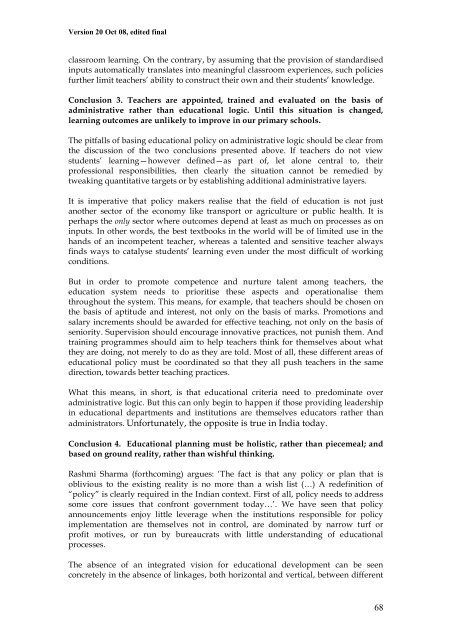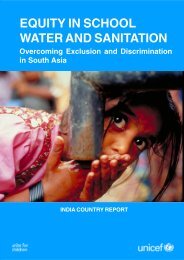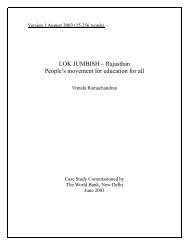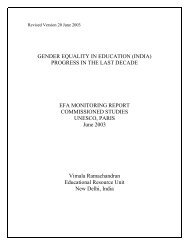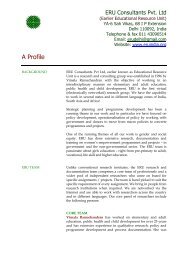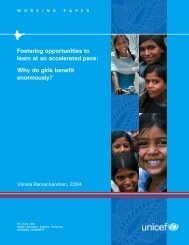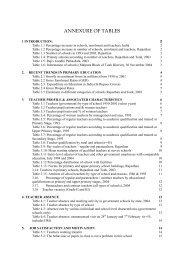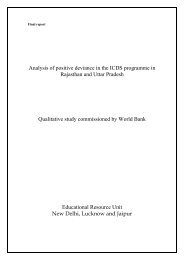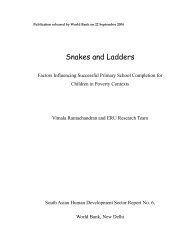primary school teachers the twists and turns of everyday practice
primary school teachers the twists and turns of everyday practice
primary school teachers the twists and turns of everyday practice
You also want an ePaper? Increase the reach of your titles
YUMPU automatically turns print PDFs into web optimized ePapers that Google loves.
Version 20 Oct 08, edited final<br />
classroom learning. On <strong>the</strong> contrary, by assuming that <strong>the</strong> provision <strong>of</strong> st<strong>and</strong>ardised<br />
inputs automatically translates into meaningful classroom experiences, such policies<br />
fur<strong>the</strong>r limit <strong>teachers</strong>’ ability to construct <strong>the</strong>ir own <strong>and</strong> <strong>the</strong>ir students’ knowledge.<br />
Conclusion 3. Teachers are appointed, trained <strong>and</strong> evaluated on <strong>the</strong> basis <strong>of</strong><br />
administrative ra<strong>the</strong>r than educational logic. Until this situation is changed,<br />
learning outcomes are unlikely to improve in our <strong>primary</strong> <strong>school</strong>s.<br />
The pitfalls <strong>of</strong> basing educational policy on administrative logic should be clear from<br />
<strong>the</strong> discussion <strong>of</strong> <strong>the</strong> two conclusions presented above. If <strong>teachers</strong> do not view<br />
students’ learning—however defined—as part <strong>of</strong>, let alone central to, <strong>the</strong>ir<br />
pr<strong>of</strong>essional responsibilities, <strong>the</strong>n clearly <strong>the</strong> situation cannot be remedied by<br />
tweaking quantitative targets or by establishing additional administrative layers.<br />
It is imperative that policy makers realise that <strong>the</strong> field <strong>of</strong> education is not just<br />
ano<strong>the</strong>r sector <strong>of</strong> <strong>the</strong> economy like transport or agriculture or public health. It is<br />
perhaps <strong>the</strong> only sector where outcomes depend at least as much on processes as on<br />
inputs. In o<strong>the</strong>r words, <strong>the</strong> best textbooks in <strong>the</strong> world will be <strong>of</strong> limited use in <strong>the</strong><br />
h<strong>and</strong>s <strong>of</strong> an incompetent teacher, whereas a talented <strong>and</strong> sensitive teacher always<br />
finds ways to catalyse students’ learning even under <strong>the</strong> most difficult <strong>of</strong> working<br />
conditions.<br />
But in order to promote competence <strong>and</strong> nurture talent among <strong>teachers</strong>, <strong>the</strong><br />
education system needs to prioritise <strong>the</strong>se aspects <strong>and</strong> operationalise <strong>the</strong>m<br />
throughout <strong>the</strong> system. This means, for example, that <strong>teachers</strong> should be chosen on<br />
<strong>the</strong> basis <strong>of</strong> aptitude <strong>and</strong> interest, not only on <strong>the</strong> basis <strong>of</strong> marks. Promotions <strong>and</strong><br />
salary increments should be awarded for effective teaching, not only on <strong>the</strong> basis <strong>of</strong><br />
seniority. Supervision should encourage innovative <strong>practice</strong>s, not punish <strong>the</strong>m. And<br />
training programmes should aim to help <strong>teachers</strong> think for <strong>the</strong>mselves about what<br />
<strong>the</strong>y are doing, not merely to do as <strong>the</strong>y are told. Most <strong>of</strong> all, <strong>the</strong>se different areas <strong>of</strong><br />
educational policy must be coordinated so that <strong>the</strong>y all push <strong>teachers</strong> in <strong>the</strong> same<br />
direction, towards better teaching <strong>practice</strong>s.<br />
What this means, in short, is that educational criteria need to predominate over<br />
administrative logic. But this can only begin to happen if those providing leadership<br />
in educational departments <strong>and</strong> institutions are <strong>the</strong>mselves educators ra<strong>the</strong>r than<br />
administrators. Unfortunately, <strong>the</strong> opposite is true in India today.<br />
Conclusion 4. Educational planning must be holistic, ra<strong>the</strong>r than piecemeal; <strong>and</strong><br />
based on ground reality, ra<strong>the</strong>r than wishful thinking.<br />
Rashmi Sharma (forthcoming) argues: ‘The fact is that any policy or plan that is<br />
oblivious to <strong>the</strong> existing reality is no more than a wish list (…) A redefinition <strong>of</strong><br />
“policy” is clearly required in <strong>the</strong> Indian context. First <strong>of</strong> all, policy needs to address<br />
some core issues that confront government today…’. We have seen that policy<br />
announcements enjoy little leverage when <strong>the</strong> institutions responsible for policy<br />
implementation are <strong>the</strong>mselves not in control, are dominated by narrow turf or<br />
pr<strong>of</strong>it motives, or run by bureaucrats with little underst<strong>and</strong>ing <strong>of</strong> educational<br />
processes.<br />
The absence <strong>of</strong> an integrated vision for educational development can be seen<br />
concretely in <strong>the</strong> absence <strong>of</strong> linkages, both horizontal <strong>and</strong> vertical, between different<br />
68


